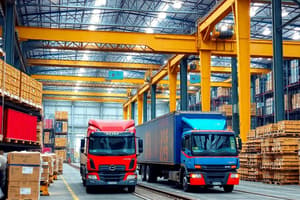Podcast
Questions and Answers
What is ownership in an organization?
What is ownership in an organization?
Ownership is the legal control over a business.
Which of the following are patterns of ownership in Malaysia? Select all that apply.
Which of the following are patterns of ownership in Malaysia? Select all that apply.
- Department of state
- Semi-public (correct)
- Public (correct)
- Private (correct)
Private limited companies in Malaysia can have 100% ownership by one individual.
Private limited companies in Malaysia can have 100% ownership by one individual.
True (A)
Commercial vehicles in Malaysia require specific ____ for operation.
Commercial vehicles in Malaysia require specific ____ for operation.
Match the following types of driving licenses with their descriptions:
Match the following types of driving licenses with their descriptions:
What is the role of the RECEIVER (CONSIGNEE)?
What is the role of the RECEIVER (CONSIGNEE)?
What is the role of the GOVERNMENT in transportation?
What is the role of the GOVERNMENT in transportation?
What does the PUBLIC expect from transportation?
What does the PUBLIC expect from transportation?
What is the main role of the CENTRAL AND LOCAL GOVERNMENT in Malaysia?
What is the main role of the CENTRAL AND LOCAL GOVERNMENT in Malaysia?
Malaysia is a constitutional monarchy and parliamentary democracy with three levels of government: federal, state, and __________.
Malaysia is a constitutional monarchy and parliamentary democracy with three levels of government: federal, state, and __________.
Match the following components related to Transportation and their descriptions:
Match the following components related to Transportation and their descriptions:
Study Notes
Structure and Organization of Transportation
- Types of Ownership Patterns:
- Private
- Semi-public and public
- Department of state
Private Ownership
-
Sole Proprietorships:
- Simplest business structure owned by one individual
- Restricted to Malaysian citizens in Malaysia
- Suitable for those with sufficient funds for independent business initiation
- Owner has complete control over the business and retains all profits
-
Private Limited Companies:
- Distinct legal entity separate from its owners
- Typically owned and regulated by state or federal governments
- One of two types of share-limited companies in Malaysia
-
Partnerships:
- Involves two to twenty individuals working together
- Combining their resources for business operations
- A starting agreement outlines roles, decision-making, and how profits or losses will be shared among partners
Semi-Public/Government-Linked Corporation (GLC)
- Businesses with a primary commercial goal:
- In which the Malaysian government has a direct controlling interest
- Examples: Petronas, Sime Darby Berhad, PNB, CIMB, EPF, TH, and Khazanah Nasional Berhad
Department of State
- 13 states in Malaysia:
- Each state has its own government
- State governments work similar to the federal government in Malaysia
- Using a system called the Westminster Parliamentary system
Carriers and Transportation Firms
- Common Carriers:
- People or businesses that transport goods or people for others
- Either for free or in exchange for payment
- Four main types:
- Common carriers
- Non-vessel operating common carriers (NVOCC)
- Private carriers
- Public carriers
Commercial Vehicles in Malaysia
-
Definition:
- Commercial vehicles encompass lorries, trailers, vans, taxis, and buses
- Require specific permits for operation
-
Types of Licensed Transportation:
- Taxi
- Bus
- Light Vehicle
- Heavy Vehicle
- Out of Gauge (OOG) and Special Permits
Roles in Transportation
-
Shipper (Consigor):
- Initiates the transportation process
- Aims for swift and secure delivery
- Objective: successful transaction involves moving goods efficiently and cost-effectively
-
Receiver (Consignee):
- Receives the shipped goods
- Seeks low-cost, reliable transportation with prompt delivery
- Objective: wants goods delivered swiftly and affordably
-
Carrier and Agents:
- Carrier: provides transportation services
- Agent: represents a party when dealing with a third party
-
Government:
- Regulates and oversees transportation through policies and rules
- Ensures stable and efficient transportation
- Objective: seeks a robust transportation environment for sustained economic growth
-
Public:
- Comprises individual consumers and businesses
- Expects accessible, reasonably priced, safe, and reliable transportation
- Objective: demands easily available and reasonably priced transportation, emphasizing safety and environmental impact
Studying That Suits You
Use AI to generate personalized quizzes and flashcards to suit your learning preferences.
Related Documents
Description
This quiz covers the structure and organization of transportation, including patterns of ownership, third-party logistics, and commercial vehicle permits.




